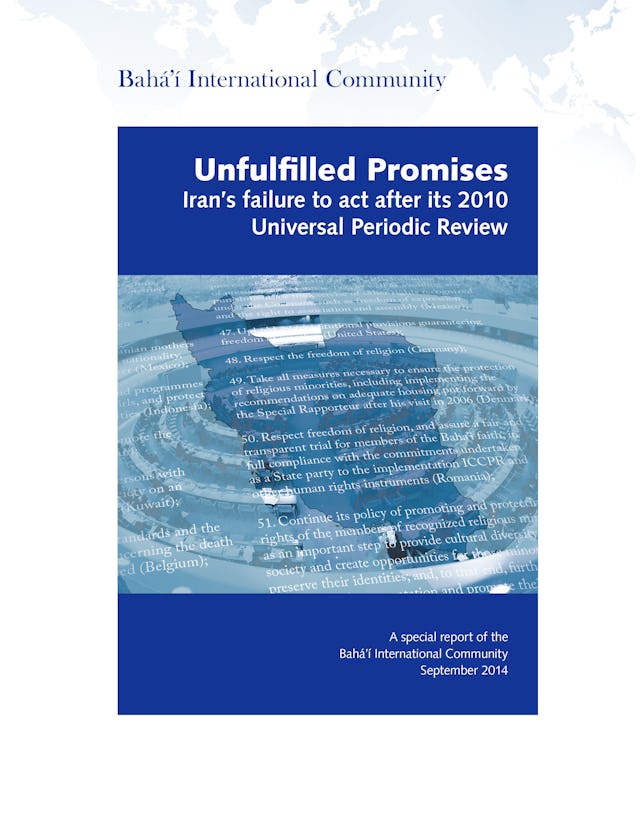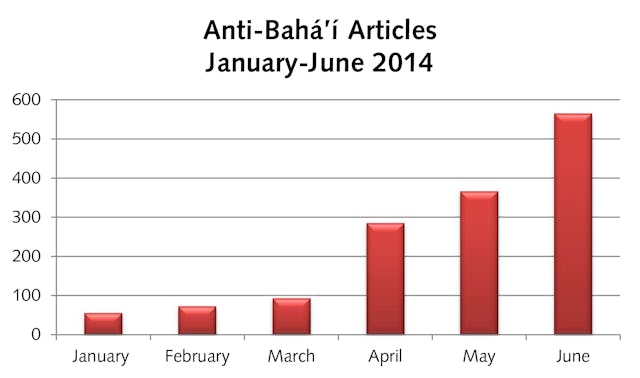New report on Iran's failed promises on human rights
GENEVA, Switzerland — Iran has completely failed to live up to a series of promises it made regarding its treatment of Iranian Baha'is four years ago, says the Baha'i International Community in a new report.
Titled "Unfulfilled Promises", and launched today at the United Nations headquarters in Geneva, the report discusses 34 specific pledges made by Iran in February 2010 at the UN Human Rights Council that in some way could address human rights violations faced by members of Iran's Baha'i community.
"Iran has utterly failed in every case to fulfill the commitments it made to improve human rights in relation to its treatment of Baha'is when it stood before the Human Rights Council four years ago," said Diane Ala'i, the BIC's representative to the United Nations in Geneva, discussing the report.
"The Council is built on the idea that its members will be honest and sincere in their pursuit of human rights, and Iran's record of 'unfulfilled promises' is a sad testimony of the gap between that country's rhetoric and reality," said Ms. Ala'i.
The pledges made by Iran came during a procedure known as the Universal Periodic Review (UPR). Held on each member state every four years, the UPR is designed to be a process that treats all states equally in considering their human rights records. Iran's first review was in February 2010, and it will undergo its next review in October 2014.
During its 2010 review, Iran accepted 123 recommendations made by other countries about specific steps it could take to improve its human rights.
Four of those recommendations referred specifically to Iran's treatment of the Baha'i community.
Specifically, three recommendations accepted by Iran called for a "fair and transparent" trial for the seven imprisoned Iranian Baha'i leaders, who, in fact, were being tried at the time of the UPR, in 2010.
"Unfortunately, as everyone knows, that trial was marked by numerous violations of due process, from a closed courtroom to obvious judicial bias," said Ms. Ala'i, noting that their lawyers have said the indictment against the seven was "more like a political announcement, rather than a legal document" that was "written without producing any proof for their allegations."
Another recommendation called on Iran to "judicially prosecute" those who incite hatred against Baha'is.
"Yet, during the first half of 2014, the volume of such media attacks rose sharply, from 55 in January to at least 565 in June," said Ms. Ala'i, recounting figures from the report. "Yet the government has done nothing, as these attacks are made at the government's instigation.
"Baha'is continue to be denied access to any form of Iranian mass media where they could counter the false statements and allegations being made about them and their faith, the purpose of which is nothing less than an attempt to rouse the general population against the Baha'is and to justify the persecution of them," said Ms. Ala'i.
Another 26 recommendations cover human rights, such as protection from torture or freedom from economic and educational discrimination, that have also been withheld from Iranian Baha'is in recent years.
"Our report shows, on a recommendation-by-recommendation basis, how none of these commitments have been fulfilled," said Ms. Ala'i.
There are currently more than 100 Baha'is in prison, she noted, all held solely because of their religious beliefs.
Today's launch, held in room XXIV at the Palais des Nations, also featured the presence of Mahnaz Parakand, one of the lawyers who helped to defend the seven imprisoned Baha'i leaders during their trial in 2010.
She said it was clear that the outcome of the trial had been pre-determined.
"The judiciary has become a place to limit the freedom of people," said Ms. Parakand. "The judges of the revolutionary court have become machines that simply sign the sentences that had been decided by the Ministry of Information.
"Everything in the way the trial took place showed that it was the trial of the Baha'i community of Iran, not of the seven leaders," Ms. Parakand said.

